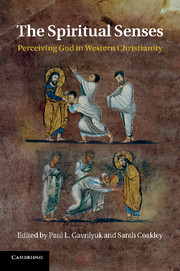Book contents
- Frontmatter
- Contents
- Contributors
- Foreword
- Abbreviations
- Introduction
- Chapter 1 Origen of Alexandria
- Chapter 2 Gregory of Nyssa
- Chapter 3 Augustine
- Chapter 4 Gregory the Great
- Chapter 5 Pseudo-Dionysius the Areopagite
- Chapter 6 Maximus the Confessor
- Chapter 7 Alexander of Hales
- Chapter 8 Thomas Gallus
- Chapter 9 Bonaventure
- Chapter 10 Thomas Aquinas
- Chapter 11 Late medieval mystics
- Chapter 12 Nicholas of Cusa
- Chapter 13 Jonathan Edwards and his Puritan predecessors
- Chapter 14 John Wesley
- Chapter 15 Karl Rahner and Hans Urs von Balthasar
- Chapter 16 Analytic philosophers of religion
- Select bibliography
- General index
- Index of select biblical references
- References
Chapter 10 - Thomas Aquinas
Published online by Cambridge University Press: 05 December 2011
- Frontmatter
- Contents
- Contributors
- Foreword
- Abbreviations
- Introduction
- Chapter 1 Origen of Alexandria
- Chapter 2 Gregory of Nyssa
- Chapter 3 Augustine
- Chapter 4 Gregory the Great
- Chapter 5 Pseudo-Dionysius the Areopagite
- Chapter 6 Maximus the Confessor
- Chapter 7 Alexander of Hales
- Chapter 8 Thomas Gallus
- Chapter 9 Bonaventure
- Chapter 10 Thomas Aquinas
- Chapter 11 Late medieval mystics
- Chapter 12 Nicholas of Cusa
- Chapter 13 Jonathan Edwards and his Puritan predecessors
- Chapter 14 John Wesley
- Chapter 15 Karl Rahner and Hans Urs von Balthasar
- Chapter 16 Analytic philosophers of religion
- Select bibliography
- General index
- Index of select biblical references
- References
Summary
Theoretical presuppositions and desiderata
What is in some sense philosophically surprising about the spiritual senses is not that they are absent in much high scholastic theology (though this certainly is the case); it is that anyone should have posited them in the first place. God, after all, is an immaterial being, and we might be forgiven for supposing that the senses have to do merely with corporeal or material things. We might think that there is some further faculty – the mind or the intellect – that has to do with immaterial things, be they universals or particulars (such as God). Indeed, the distinction between intellect and sense is commonplace in both Platonic and Aristotelian philosophy: the intellect has to do with the intelligible (immaterial) realm, and the senses to do with the material. Admittedly, the way this distinction works out in the two traditions depends on radically different metaphysics. For Plato, the intelligible is fundamentally distinguished from the sensible: the realm of the intelligible is extrinsic to the realm of the sensible since immaterial universals are extrinsic to sensible particulars. For Aristotle, intelligible universals are immanent in the sensible particulars, and cognition is fundamentally a case of abstracting universals from the particulars. Given these distinctions between intellect and sense, it is perhaps no surprise that some philosophically rigorous thinkers saw no need to posit spiritual senses. The intellect, on either view, is required to cognize any immaterial object, and no further mental faculty is necessary.
In one of the most important moves in the history of cognitive theory in the West, Plato made the fundamental objects of cognition simple, non-compositional, Forms. Since the Forms are simple, knowledge of them is non-propositional, more akin to acquaintance or intuition than to description. God is simple in this sense, and thus, in the kind of Christianized Platonism that forms the relevant background to scholastic notions of our knowledge of God, is something that is ideally cognized non-propositionally. Now, non-compositional forms are generally understood to be universals, whereas God is a particular. So it might be thought for this reason that God is not an appropriate object for properly intellectual encounter. In fact, although the scholastics were not directly acquainted with Plato's views, it is notable that Plato may have thought of universals as objects with numerical identity, and thus as (in this sense) indivisible, and hence particular. Plato himself assumes that our cognition of his universals is something we in principle gain by direct intellectual experience, and he sometimes talks of this experience as a kind of ‘seeing’. But this is a metaphor for an entirely intellectual operation: the difference from his successor, Aristotle, is merely that Plato does not believe that this kind of cognition needs to be, or even can be, gained by straightforward abstraction from material particulars. Whatever the philosophical merits of Plato's position here, it was not open to the scholastics, since they did not know the relevant texts; and in any case, there is no reason to believe that they would have found the general psychological claim convincing, since they rejected the metaphysics underlying Plato's cognitive claims. But my point is that the claim that there are intelligible particulars is not new, or particularly unexpected – provided that the particulars are of the right kind (i.e. immaterial objects). Against this background, the motivation for positing spiritual senses is reduced or even eliminated.
- Type
- Chapter
- Information
- The Spiritual SensesPerceiving God in Western Christianity, pp. 174 - 189Publisher: Cambridge University PressPrint publication year: 2011
References
- 3
- Cited by



